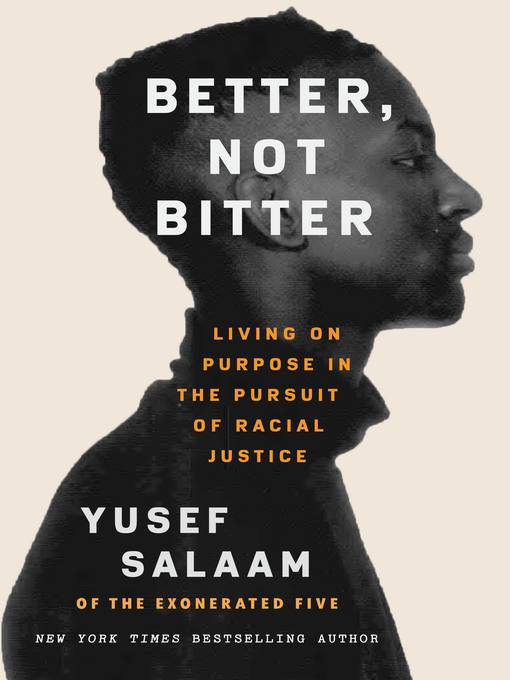
Better, Not Bitter
Living on Purpose in the Pursuit of Racial Justice
کتاب های مرتبط
- اطلاعات
- نقد و بررسی
- دیدگاه کاربران
نقد و بررسی

Starred review from April 16, 2021
Salaam, one of the Exonerated Five, writes a powerful debut memoir that recalls his childhood, his 1989 arrest and imprisonment as one of the Central Park Five, and his struggle to make a life after he was finally freed from prison and exonerated of a crime he did not commit. In straightforward prose, Salaam writes that he was still a child when he was arrested at age 14, as well as when he was released from prison at age 21. With frankness, he explains how innocent his view of life was, and describes coming home from school one day, as a New York City high school student, and being told by brother and sister that police were looking for him. So began his entry into the judicial system without a way to defend himself, especially as a juvenile. Throughout his memoir, Salaam offers insight on surviving incarceration and fighting against oppression, and testifies to the power of believing in oneself, of strong family bonds, and of spiritual healing. Ultimately, this is a story of Salaam's survival and channeling pain into power and energy. VERDICT An important memoir and call to action that sheds light on the personal injustices of mass incarceration.--Amy Lewontin, Northeastern Univ. Lib., Boston
Copyright 2021 Library Journal, LLC Used with permission.

Starred review from April 1, 2021
One of the wrongly accused and imprisoned Central Park Five recounts his experiences with an unjust system of justice. Salaam was just 15 when he "was run over by the spiked wheels of justice." That collision came when he was accused, along with four other teenagers, of raping a young woman in New York's Central Park and leaving her for dead. Tried as a juvenile, he was sent into adult custody at Rikers Island, "a notoriously violent prison from which many men never returned," before being shifted in and out of other institutions. In 2002, following a jailhouse confession by the actual attacker, the convictions were overturned. Inside the system, taking a cue from Malcolm X, Salaam accepted the fact that "it's often incumbent upon the person to educate him- or herself while inside." He completed high school and earned an associate's degree, building on his enrollment in the LaGuardia High School of Music and Art when he was only 12. "They have created cages in order to create animals so they'll have an excuse to create more cages," writes the author. "But we all have the power to blossom behind those bars." Sadly, as he notes, whereas he had the support of a loving and attentive mother, many other imprisoned people have no social network. One of the Five, unable to find work and adjust to life outside, returned to prison. Punctuating his prose with memorable images ("Fear was playing Double Dutch with my mind"), Salaam denounces a system of injustice built on the backs of Black people, demonized as born criminals. Remarkably, though Donald Trump himself made his first foray into politics on the backs of the Five, the author mentions him by name just once in a book rich in self-knowledge and compassion. "As the alchemist of your life," he writes, "you have control over the choices you make on this journey....But no matter what, you can be free." Warm, generous, and inspirational: a book for everyone.
COPYRIGHT(2021) Kirkus Reviews, ALL RIGHTS RESERVED.

May 1, 2021
Arrested at the age of 15 in 1989 along with four other boys of color for the rape of a white woman in Central Park, Salaam became known as one of the Central Park Five--often referred to now as the Exonerated Five after a confession from the actual perpetrator, with DNA corroboration. During his almost seven years in juvenile detention, Salaam earned his GED and served as an Islamic spiritual leader. He credits his faith and extended network of family, especially his mother and sister, for helping him through this time. This memoir recalls his time in prison and the continued effects after his release, decries a culture built on white supremacy and Black bodies, and serves as spiritual guidance for overcoming trauma. It's easy to see how Salaam became a motivational speaker, writing throughout the book of transforming traumatic experiences: "you must take the emotions that come up in your reflection and move that energy into something purposeful."" An uplifting and hopeful book about a terrible miscarriage of justice and the lives impacted.
COPYRIGHT(2021) Booklist, ALL RIGHTS RESERVED.

























دیدگاه کاربران